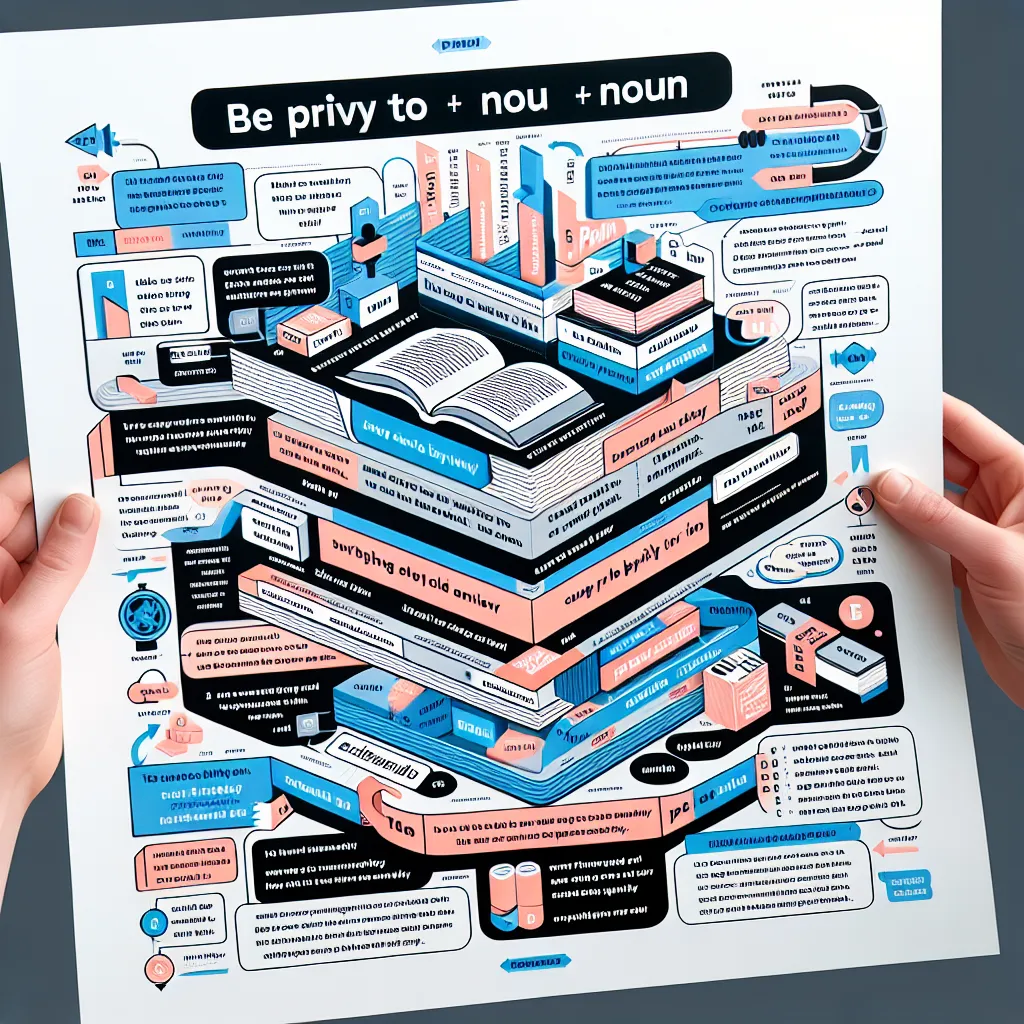The ‘be privy to + noun’ structure is an advanced grammatical construct that can significantly enhance your IELTS performance. This phrase, meaning to have knowledge of secret or private information, appears in various IELTS tasks and can help you achieve a higher band score when used correctly. Let’s explore its usage, significance, and application in IELTS.
Understanding ‘Be Privy to + Noun’
The phrase ‘be privy to’ is typically followed by a noun or noun phrase referring to information, knowledge, or details that are not widely known. It’s a formal expression often used in professional or academic contexts, making it particularly valuable for IELTS candidates aiming for higher band scores.
Grammatical Structure
The basic structure is:
[Subject] + [be] + privy to + [noun/noun phrase]
Examples:
- “The executives are privy to confidential financial information.”
- “As a senior researcher, she was privy to groundbreaking scientific discoveries.”
- “Not all employees were privy to the company’s expansion plans.”
In these examples, the nouns following ‘privy to’ represent exclusive or sensitive information.

Significance in IELTS
Understanding and correctly using ‘be privy to’ can elevate your language proficiency in IELTS, particularly in Writing and Speaking tasks. It demonstrates:
- Advanced vocabulary usage
- Ability to express complex ideas
- Familiarity with formal language structures
Application in IELTS Writing
In IELTS Writing Task 2, you can use this structure to discuss topics related to information access, privacy, or professional knowledge. For example:
“In today’s digital age, ordinary citizens are privy to an unprecedented amount of information, which can both empower and overwhelm them.”
This sentence showcases advanced language use while addressing a common IELTS topic.
Utilization in IELTS Speaking
For the Speaking test, ‘be privy to’ can be employed when discussing work, education, or societal issues. Consider this response to a question about career choices:
“In my field, researchers are often privy to cutting-edge developments, which is one of the reasons I find it so exciting.”
Enhancing Your IELTS Score
To maximize your IELTS score, consider these strategies:
-
Context is Key: Use ‘be privy to’ in appropriate contexts, typically involving exclusive or sensitive information.
-
Vary Your Sentence Structures: Combine this phrase with other complex structures. For example:
“While top managers were privy to the merger details, the general staff remained unaware until the official announcement.” -
Use in Different Tenses: Demonstrate versatility by using various tenses:
- Present: “Scientists are privy to crucial climate data.”
- Past: “Historically, only the nobility was privy to certain educational opportunities.”
- Future: “After the promotion, she will be privy to high-level strategic decisions.”
-
Incorporate into Different Question Types: In Writing Task 2, use this structure in your thesis statement, topic sentences, or conclusion to add sophistication to your essay.
Common Mistakes to Avoid
-
Incorrect Preposition: Don’t use ‘of’ or ‘with’ instead of ‘to’.
Incorrect: “They were privy of the information.”
Correct: “They were privy to the information.” -
Misusing with Public Information: Avoid using ‘be privy to’ for widely known facts.
Incorrect: “Everyone is privy to the election results.”
Correct: “Only the campaign team was privy to the candidate’s true poll numbers.” -
Overuse: While it’s a sophisticated phrase, overusing it can seem unnatural. Use it sparingly and effectively.
-
Incorrect Subject-Verb Agreement: Ensure the ‘be’ verb agrees with your subject.
Incorrect: “The committee were privy to the decision.”
Correct: “The committee was privy to the decision.”
Practice Exercises
To reinforce your understanding, try incorporating ‘be privy to’ in responses to these IELTS-style questions:
-
Writing Task 2: “Some people believe that certain information should be kept secret from the public. Do you agree or disagree?”
-
Speaking Part 3: “How has the internet changed the way people access information?”
-
Writing Task 1: Describe a graph showing levels of public trust in government information over time.
Remember, the key to mastering this structure is practice and appropriate context. By skillfully incorporating ‘be privy to’ in your IELTS responses, you demonstrate a sophisticated command of English, potentially boosting your band score.
For more IELTS preparation tips, you might find this article on describing a person passionate about art helpful in expanding your descriptive vocabulary.